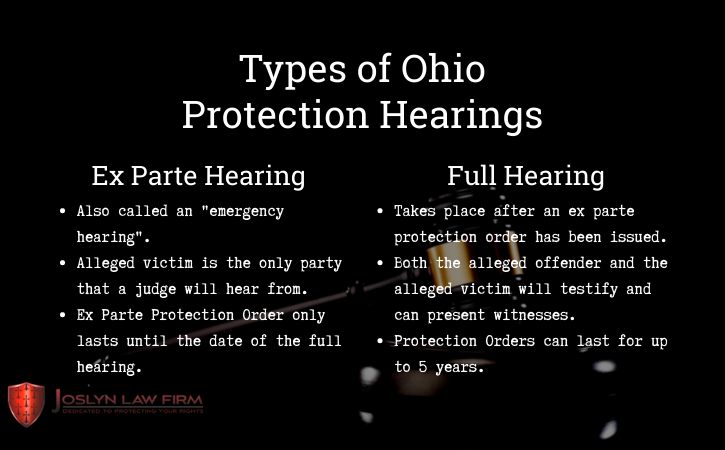Protection Order Hearings
 A protection order—commonly referred to as a restraining order—is a court order that is intended to protect the victims of alleged domestic violence. Courts in Ohio will hold hearings to review evidence and hear testimony before issuing these orders.
A protection order—commonly referred to as a restraining order—is a court order that is intended to protect the victims of alleged domestic violence. Courts in Ohio will hold hearings to review evidence and hear testimony before issuing these orders.
An alleged offender can be the subject of a protection order even when he or she has not been the subject of any criminal charges. In some cases, alleged victims manufacture or exaggerate claims of domestic violence to gain protection orders for leverage in heated divorce or child custody proceedings.
Lawyer for Protection Order Hearings in Cincinnati, OH
Has another person filed for a protection order against you in Hamilton County? Before you appear for any hearing, it will be in your best interest to contact Joslyn Law Firm for legal representation.
Cincinnati criminal defense attorney Brian Joslyn represents clients in matters relating to domestic violence in Blue Ash, Reading, Harrison, Miamitown, Colerain, Green, Miami, Symmes, Norwood, and surrounding areas of southwest Ohio. Call right now to take advantage of a free, confidential consultation.
Overview of Protection Order Hearings in Ohio
- How does the protection order hearing process work?
- What are the possible things that a protection order can make an alleged offender do?
- Where can victims learn more about domestic violence protection orders in Cincinnati?
Protection Order Hearing Process in Hamilton County
Not all protection orders are the same. If an alleged offender has been charged with a crime relating to domestic violence, then a municipal court will issue a criminal protection order. If there are no criminal charges against the alleged offender, an alleged victim can still seek a civil protection order from the domestic relations court.
Alleged victims can seek criminal protection orders if they have been the victims of any of the following offenses:
- Aggravated Assault
- Aggravated Trespass
- Burglary
- Criminal Damaging/Endangering
- Criminal Mischief
- Domestic Assault / Battery
- Domestic Violence
- Endangering Children
- Felonious Assault
- Menacing by Stalking
In general, an alleged victim will need to get the necessary forms from the courthouse and submit that paperwork to apply for a protection order. The court may hold two hearings relating to the possible issuance of a protection order:
- Ex Parte Hearing — Also called an emergency hearing, “ex parte” is Latin for “from the/a party.” In legal parlance, ex parte refers to decisions in which the judge renders a decision based on only hearing from one side in a dispute. Thus, an alleged victim (referred to as the petitioner) is the only party that a judge will hear from at an ex parte hearing. If the judge decides to issue an ex parte protection order, it will only last until the date of the full hearing.
- Full Hearing — After an ex parte protection order has been issued, the alleged offender (referred to as the respondent) will be served the ex parte order, a copy of the alleged victim’s petition, and notice of the date of the full hearing. At the full hearing, both the alleged offender and the alleged victim will testify and can present witnesses. If the court issues a protection order, it can last for up to five years.
Types of Protection Order Injunctions in Cincinnati
A protection order may impose any number of specific restrictions on an alleged offender called injunctions. An injunction is a judicial order that orders the subject to perform a certain act or forbids the subject from performing a certain act.

- Direct the respondent to refrain from abusing or from committing sexually oriented offenses against the family or household members;
- Grant possession of the residence or household to the petitioner or other family or household member, to the exclusion of the respondent, by evicting the respondent, when the residence or household is owned or leased solely by the petitioner or other family or household member, or by ordering the respondent to vacate the premises, when the residence or household is jointly owned or leased by the respondent, and the petitioner or other family or household member;
- When the respondent has a duty to support the petitioner or other family or household member living in the residence or household and the respondent is the sole owner or lessee of the residence or household, grant possession of the residence or household to the petitioner or other family or household member, to the exclusion of the respondent, by ordering the respondent to vacate the premises, or, in the case of a consent agreement, allow the respondent to provide suitable, alternative housing;
- Temporarily allocate parental rights and responsibilities for the care of, or establish temporary parenting time rights with regard to, minor children, if no other court has determined, or is determining, the allocation of parental rights and responsibilities for the minor children or parenting time rights;
- Require the respondent to maintain support, if the respondent customarily provides for or contributes to the support of the family or household member, or if the respondent has a duty to support the petitioner or family or household member;
- Require the respondent, petitioner, victim of domestic violence, or any combination of those persons, to seek counseling;
- Require the respondent to refrain from entering the residence, school, business, or place of employment of the petitioner or family or household member;
- Grant other relief that the court considers equitable and fair, including, but not limited to, ordering the respondent to permit the use of a motor vehicle by the petitioner or other family or household member and the apportionment of household and family personal property;
- Require that the respondent not remove, damage, hide, harm, or dispose of any companion animal owned or possessed by the petitioner;
- Authorize the petitioner to remove a companion animal owned by the petitioner from the possession of the respondent.
Violations of any of these orders can result in criminal charges.
Ohio Resources for Protection Order Hearings
Civil Protection Orders | Hamilton County Clerk of Courts — Victims of domestic violence can file for civil protection orders if they are related to respondents by blood or marriage and have lived with respondents at any time, are living with or have lived with respondents during the past five years, used to be married to respondents, or have a child with respondents, whether or not they were ever married or lived together. Victims can apply for civil protection orders by obtaining the paperwork at the Domestic Relations Docket Office.
Hamilton County Clerk of CourtsHamilton County Courthouse
1000 Main St
Cincinnati, OH 45202
(513) 946-5656
WomensLaw.org | Ohio: Restraining Orders — WomensLaw.org is a website that was launched to provide state-specific legal information and resources for survivors of domestic violence. On this section of the website, you can learn more about restraining orders in Ohio. The website provides an overview of the differences between criminal law and civil law, domestic violence protections orders, and issues relating to moving out of state or enforcing an order from another state in Ohio.
Joslyn Law Firm | Cincinnati Protection Order Hearing Lawyer
If you are the respondent in a protection order in Hamilton County, it is critical for you to understand the benefits of retaining legal counsel for your full hearing. Joslyn Law Firm represents clients all over southwest Ohio at these hearings and fights to achieve the most favorable outcomes.
Brian Joslyn is an experienced criminal defense attorney in Cincinnati who defends clients in Springdale, Montgomery, Bridgetown, Anderson, Delhi, Harrison, Springfield, Sycamore, Forest Park, and many nearby other communities. You can have our lawyers provide an honest and thorough evaluation of your case when you call (513) 399-6289 or fill out an online contact form to schedule a free consultation.




























